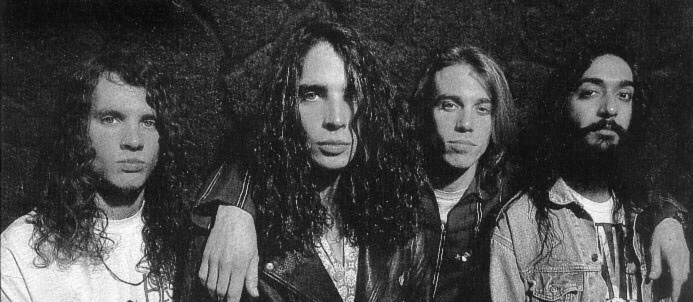Soundgarden was around long before Pearl Jam, before Nirvana, before Alice in Chains; they were the Seattle sound before there was a Seattle sound. Soundgarden planted the first seeds of “grunge” when the term still referred to the dirty underbelly that provided the counterpoint to the pop-rock excess of the ’80s, and offered the ultimate blueprint for how to escape the label when grunge was fading away in the mid-’90s. Always a step ahead of their contemporaries, Soundgarden’s light burned too intensely to last, eventually dying out following the release of 1996’s Down on the Upside.
In this edition of Note for Note, we take a look at the music of Soundgarden. Tomorrow, we’ll look at the circuitous journey that Chris Cornell, Soundgarden’s lead vocalist and most visible member, took through solo work and the remains of another well-established band to eventually arrive back where he began.
A reminder: The grades assigned to each of these albums are reflective of the individual authors who wrote about them, and may or may not be reflective of the opinions of the rest of the staff.
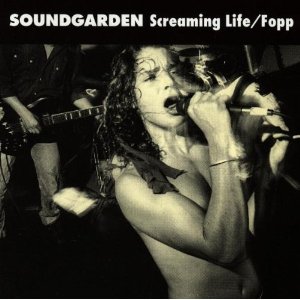 Soundgarden – Screaming Life/Fopp (1987-1988)
Soundgarden – Screaming Life/Fopp (1987-1988)
Jay: Soundgarden made its recorded debut in 1987 with the EP Screaming Life, produced by O.G. grunge knob-twiddler Jack Endino. The six-song release features original bassist Hiro Yamamoto and provides a good blueprint for the band’s eventual sound. Kim Thayil’s riffs aren’t as meaty and heavy as they would become on later albums, and Chris Cornell’s vocal style is still in the formative stages. The opening track, “Hunted Down”, features a killer main riff that drives the song and “Nothing to Say” is the song that sounds most like future Soundgarden, complete with drop D tuning and slow, sludgy pacing. “Entering” is a sinister, drawn-out sizzler, while “Tears to Forget” reflects the band’s punk side. The band enters Gang of Four/PiL territory with the chiming guitars and heavy bass of “Little Joe”, while “Hand of God” features found recordings of a preacher’s sermon interspersed with Cornell’s wailings. The Fopp EP was released in 1988 and featured one Soundgarden original, “Kingdom of Come,” two covers, and a remix of one of the covers. The title track is an Ohio Players jam that Soundgarden rocks up while retaining its funk essentials and the other cover is of Green River’s grunge classic “Swallow My Pride”. The EP ends with a somewhat unnecessary dub remix of “Fopp”. The EPs were packaged together on 1990’s Screaming Life/Fopp release. Listened to as a single unit, it is a sign of good things to come.
Grade: B
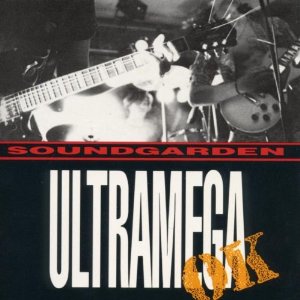 Soundgarden – Ultramega OK (1988)
Soundgarden – Ultramega OK (1988)
Grez: Ah, the first full-length offering from Soundgarden, fresh, raw, and chock-full of all of the things you expect from a young band, for better or for worse. The signature sound that Soundgarden would hone over the next 10 years or so is hinted at here, but not fully developed. Like many debut LPs, we hear the band still experimenting with a lot of different musical directions, pulling some of the more successful recipes forward from their two previous EPs, trying out some longer concept material, and dabbling in traditional styles seemingly at random. For instance, the two lead tracks, “Flower” and “All Your Lies” immediately tie Ultramega OK back to familiar material from Screaming Life/Fopp, albeit slightly more mature in terms of songwriting. But then Soundgarden immediately jars the listener with the experimental three-track combo of “665/Beyond The Wheel/667,” leaving one wondering about the true significance of that central track and what exactly that metaphor is really intended to mean (something that all of the songwriters in Soundgarden would continue to do going forward, especially Cornell and Thayil). Sonically, these tracks suggest their future sound, especially in terms of the grunge era, probably better than anything else on the album. The rest of the disc is filled with a mish-mash of different sounds: the acoustically-driven main riff of “Mood For Trouble,” the hardcore speed of “Circle of Power,” the neo-punk crush of “Nazi Driver,” and the straight-up blues riffing of “Smokestack Lightning” and “Incessant Mace.” Despite the fact that the seemingly random shifts of style make the album feel a bit messy and disjointed (and ending the disc in the pointless “One Minute of Silence” adds to this feeling), almost everything is appealing in its own right. The band’s chops are certainly there; technical prowess is not an issue, and they clearly establish here why they would be respected as one of the most musically talented of the upcoming onslaught of new ’90s bands. Cornell shows off his amazing vocal range, Kim Thayil starts to really develop his bottom-heavy big-riff sound, and Matt Cameron absolutely destroys the skins throughout the disc. The result is, predictably enough, a good start to an amazing career, and one which, with a new album being released after a long hiatus, is thankfully not over. While Ultramega OK never delivers the consistent experience of Badmotorfinger or Superunknown, for listeners in the late ’80s, it was something very, very different than the popular hair metal of the day that made people take notice and realize that something very important and change-inducing was coming out of Seattle…a couple of years before anyone had even heard of Nirvana or Pearl Jam.
Grade: B
[youtube=http://www.youtube.com/embed/mAjiMB3UZro]
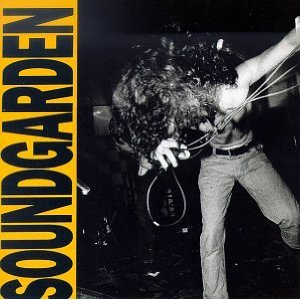 Soundgarden – Louder than Love (1989)
Soundgarden – Louder than Love (1989)
Jesse: The major label debut! The sell out album! Call Louder than Love what you will, the thing is still a monster today and the blueprint for what any major label album debut from an indie band should sound like. It still retained the raw edge that garnered Soundgarden such a loyal following to begin with yet polished their sound immensely. If Louder than Love didn’t exist, Badmotorfinger and Superunknown would not exist. I’ll go so far as to say that neither would Ten, Dirt, or Nevermind. “Ugly Truth” and “Hands All Over” are essential album starters. Kim Thayil wails all over those two but of course, it’s the voice of Chris Cornell that completes the package. Louder Than Love is an appropriate title here because Cornell’s croon sounds so effing loud. It helps that Cornell wrote more than half the songs here as well. Production came from Terry Date (who would later produce some defining albums for Deftones and Pantera) who made everything sound so crisp. Those guitars in “Loud Love”. Hiro’s bass on “Uncovered”. Matt Cameron’s drumming EVERYWHERE. It all sounded (and still sounds) incredible. Louder than Love was also notable for featuring the final appearance of bassist Hiro Yamamoto, and for featuring “Big Dumb Sex” which would later be covered by Guns N’ Roses. If this is what selling out sounds like, where do I sign?
Grade: A
 Temple of the Dog – Temple of the Dog (1991)
Temple of the Dog – Temple of the Dog (1991)
Jay: Supergroups often have a tendency to stumble, either because of a lack of chemistry or a lack of quality material. But what about a supergroup formed before any of its members were stars? Temple of the Dog was a project formed by Chris Cornell as a way to memorialize his friend Andrew Wood, the frontman of glam-rock act Mother Love Bone who died of an overdose in 1990. Cornell and bandmate Matt Cameron enlisted two former members of Mother Love Bone, guitarist Stone Gossard and bassist Jeff Ament, as well as newcomers Mike McCready and Eddie Vedder; the latter four were in a band known then as Mookie Blaylock, which would eventually become Pearl Jam (actually, Vedder had just flown to Seattle to audition for the band). Released in April 1991, the album didn’t garner much attention, but a year later, after both Soundgarden and Pearl Jam had become star acts, A&M reissued the album and it eventually went platinum, primarily on the strength of the single and video “Hunger Strike”. Temple of the Dog was a departure from Cornell’s darker, heavier work with Soundgarden, emphasizing the more melodic riff rock that Pearl Jam would later specialize in. “Say Hello 2 Heaven” and “Call Me a Dog” are mellower tributes to Wood, while the 11-minute “Reach Down” is a guitar-solo tour de force for McCready. Not bad for a quickly-recorded one-off.
Grade: A-
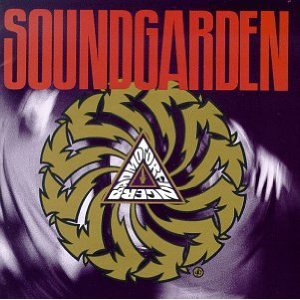 Soundgarden – Badmotorfinger (1991)
Soundgarden – Badmotorfinger (1991)
Dr. Gonzo: As history tells it, grunge (specifically Nirvana’s Nevermind) took us away from the excess of late 1980s hair metal and into a new era of so-called “alternative” rock. This kind of revisionism oversimplifies the progression, however. Many of the biggest names in “grunge” pulled a great deal of stylistic influence from metal (albeit, not the glammy hair metal of the LA scene) and mixed it up with a variety of other influences. All of this is to say that grunge was actually a logical progression from metal, and that influence is audible in a number of bands. Soundgarden is certainly one of them, and their 1991 breakthrough album Badmotorfinger loudly echoes elements from the heavy metal genre. The album is in your face straight from the first track (“Rusty Cage”) and never really lets up. Sure, it jumps from uptempo rockers like “Outshined” and “Face Pollution” to midtempo sludge grooves like “Slaves and Bulldozers” and “Searching with My Good Eye Closed.” But there’s truly no filler, which was not the case for the multiplatinum followup Superunknown. You get the sense that this was the album Soundgarden had in them all along, but was waiting for the right moment to (very loudly) introduce themselves to the world and establish their reputation as one of the decade’s most interesting rock acts.
Grade: A
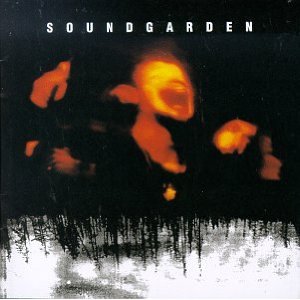 Soundgarden – Superunknown (1994)
Soundgarden – Superunknown (1994)
Stephen: Range isn’t necessarily something one associates with the grunge era. Certainly, the modern spawn of the subgenre aren’t known for much subtlety (I’m looking at you Nickelback, Three Days Grace, and Puddle of Mudd). However, I think a lot of that slagging is because modern post-grunge has blinded us to the work of the earlier pioneers, a blaming of the fathers for the sins of the sons. However, anyone who thinks of grunge as a strictly baroque affair would do well to revisit Soundgarden’s breakthrough success Superunkown. The staples of the grunge-era are still present, undoubtedly, and Soungarden still wears their heavy metal and punk roots on their sleeves, as evidenced through the drop D chug of “Let Me Drown” and the even heavier down-tuning on “Mailman” and “Limo Wreck”. But there is a creativity and nuance amongst the heaviness. “Half” draws heavily on Middle-Eastern music, and the band credits the Beatles as the inspiration for the psychedelic “Black Hole Sun”. The best parts of Soundgarden, however, have always been their impeccable riffage and Chris Cornell’s soaring, shrieking vocals, and Superunkown features both at their career peaks. The title track melds an energetic hammer-on/pull-off guitar melody with a perfect Cornell-driven chorus. “My Wave” and “Spoonman” showcase the classic, restrained riffs of Kim Thayil: technically masterful, incredibly catchy, but never overly showy. Cornell takes the spotlight on “Fell on Black Days”, a dark ballad carried by his passionate delivery of “I want to know, if this will be my fate.” I’d be remiss if I didn’t give credit to the rhythm section of Matt Cameron and Ben Shepherd, however, for grounding the whole album despite a plethora of absolutely insane time signatures. Cameron’s work on “Spoonman” especially is a polyrhythmic master’s course. Lyrically, Superunknown is a darker, more mysterious work than Badmotorfinger, breaching topics like drug use (“4th of July”), suicide (“Like Suicide” and “Let Me Drown”), and social isolation (“The Day I Tried to Live”). But it’s never an overbearing darkness (Cornell in an interview compared it to a Druid-like celebration of life while always looking towards death), and the fluidity of the tracks helps keep the momentum through to the very end. You’ve probably heard at least a few tracks from Superunknown on the radio, but the album’s deeper tracks like “4th of July” and “Let Me Drown” hold up just as well. If you’ve never given Soundgarden a fair shake, you need to start here. It’s not just the band’s best-selling work, it’s their best work, period.
Grade: A
 Soundgarden – Down on the Upside (1996)
Soundgarden – Down on the Upside (1996)
Jay: Following the breakthrough success of Superunknown, you would have thought everything would be hunky dory in Soundgardenland. Alas, it was quite the opposite, with the band splintering in four different directions. No doubt some problems emerged from Chris Cornell’s status as a grunge matinee idol, shirtless and flexing on umpteen magazine covers. Cornell and Kim Thayil had been in the band since 1984 and drummer Matt Cameron joined a few years later, so perhaps tensions that simmered over that decade-plus boiled over once the band finally became a household name. And then there’s the ever-popular “musical differences.” Whatever the case, 1996’s Down on the Upside was the band’s swan song. Given the strife in the band at the time, the album holds together pretty well. Perhaps in response to the huge radio and MTV fervor for the relatively poppy “Black Hole Sun” from Superunknown, Soundgarden chose to release the decidedly un-poppy “Pretty Noose” as the first single this time around. Good song, but not your prototypical lead single material. Next two singles “Burden in My Hand” and “Blow Up the Outside World” fit that bill, however, and have subsequently become alt-rock radio staples to this day. The fourth single, “Ty Cobb”, didn’t even chart on rock radio, but that’s probably because it’s a punkish ripper (with a little bluegrass mixed in) featuring the repeated refrain “Hard headed fuck you all.” Cornell, as always, was the dominant creative force, writing most of the lyrics and music, but bassist Ben Shepherd stepped up and wrote the music for six of the songs and Cameron contributed two. Thayil only received writing credit for one song, “Never the Machine Forever”, but of course, he still provided the riffs and solos throughout. That said, the album features a lot less of the patented Thayil riffage in favor of more dynamics: acoustic guitar, mandolin, slower tempos. But there are still the traditional Soundgarden barn-burners in the form of “No Attention”, “Never the Machine Forever”, and “Rhinosaur”. Not long after the tour for the album ended, the band split up, but at least they left us a memorable parting gift.
Grade: A
Want more Cornell in your life? Who doesn’t? Click here for part 2 of our feature.

